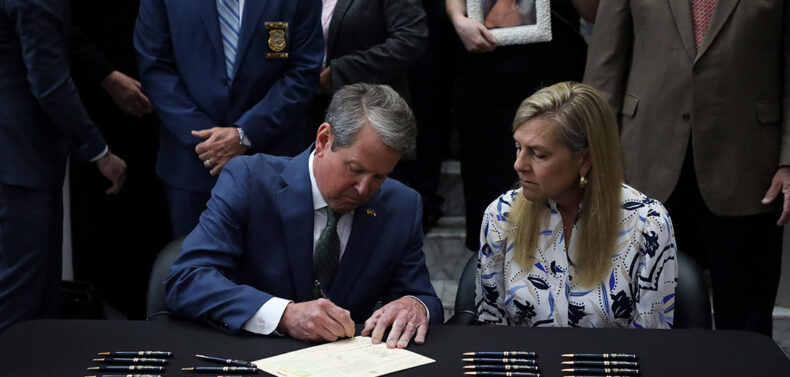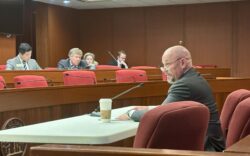Gov. Brian Kemp vetoed legislation that would have allowed legislators to control tuition hikes at public universities ahead of last week’s deadline for signing or rejecting legislation passed by the General Assembly.
Kemp vetoed two higher education measures and signed 250-plus bills during the 40-day window after the Mar. 29 end of the 2023 legislative session to decide which bills he would sign, would allow to become law unsigned or would be placed on the chopping block. Kemp signed off on a flurry of legislation, including a $32 billion state spending plan starting July 1 that features pay raises for teachers, police officers and other state employees. Kemp also signed off on controversial laws that create a new disciplinary board for district attorneys, ban local officials from accepting private donations for election administration and require local officials to enforce laws on homeless public encampments.
Among Kemp’s 14 vetoes was House Bill 319, which would have required state legislators to approve tuition increases of more than 3% at Georgia’s public colleges and universities. The legislature cannot unilaterally remove the Board of Regents’ power to set tuition costs for the 26 institutions that make up the University System of Georgia, Kemp said. Any changes to how the Board of Regents operates would require a constitutional ballot referendum going before Georgia voters, the Republican governor said.
A number of state lawmakers have expressed frustration over the cost of a new electronic medical records system approved by regents and University System of Georgia Chancellor Sonny Perdue, who took over last year after Kemp removed several members of the Board of Regents. Perdue, a former Georgia governor, has said the regents board may increase tuition in order to cover a $66 million cut in the state budget for the medical records system.
Kemp also nixed House Bill 249 that would have expanded needs-based financial assistance to college students and prevented technical schools from charging tuition to veterans enrolled in commercial driver’s license programs.
Kemp said that legislators did not provide enough funding to pay for increasing grants $2,500 to $3,500 for students who can’t pay the full price of college tuition and to offset the lost tuition at technical colleges. The legislation had support from powerful GOP lawmakers.
“I support veterans initiatives and making education more affordable,” Kemp said in his veto message. “However, the proposals in this bill are subject to appropriations and the General Assembly failed to fully fund these educational incentives.”
The $32.4 billion state budget signed by Kemp will provide a $2,000 pay raise for state employees, public school teachers and employees of Georgia’s public higher education institutions. In addition, the budget includes salary increases for nurses and custodians in K-12 schools, as well as a $6,000 raise for state troopers and some other law enforcement officers. The budget also increases the amount of tuition awarded to HOPE college scholarship recipients.
This new budget also includes $1.6 million allocated to a new prosecutors oversight commission intended to review complaints lodged against local district attorneys and allow the board to dish out punishment. Senate Bill 92, which Kemp signed last week, is hailed by Republican supporters as a tool for reigning in rogue district attorneys. The new commission will spell out standards for prosecutors and solicitors.
Democratic lawmakers and other critics argue that the Republicans’ plan removes prosecutorial discretion to deciding how cases should be prioritized in each community. Some local prosecutors in Democratic strongholds have said publicly they will not make prosecuting possession of small amounts of marijuana a priority. Democrats have also connected the GOP’s push for an oversight commission with the ongoing investigation into the post-election 2020 actions of former President Donald Trump by Fulton County District Attorney Fani Willis.
Meanwhile, Kemp also signed a law that its backers call a necessary first step in addressing systemic homelessness. The new law gives the state attorney general the power to intervene if local officials try to block enforcement of ordinances prohibiting unauthorized sleeping on sidewalks and other public spaces. Critics argue, however, that it criminalizes homelessness by putting more pressure on local governments and police departments to enforce the laws against public camping.
Kemp signed a controversial law that makes it a felony for local election officials to accept direct donations for local election administration. In a statement, Sen. Max Burns (R-Sylvania) said Senate Bill 222 closes a loophole that has enabled some Democratic-leaning counties to receive millions of dollars during the 2020 election cycle. Under the new law, any private donations would be distributed through state election officials. Democratic lawmakers and several county election supervisors, however, have emphasized that donations were essential for buying election equipment and paying poll workers, particularly during the worst of the 2020 pandemic.
“This measure is an important and necessary step in guaranteeing our elections are not subject to interference from third-party organizations,” Burns said. “It is vital that all funding for elections is properly allocated from the state level to limit the possibility that our state and local election workers are influenced by organizations that operate on their own self-interest.”
Kemp also signed off on a new law that allows people to take time off work during early voting. Voters now have a two-hour window during the early voting period and on Election Day.
“This bill would further empower Georgians to participate in one of the most important civic duties,” said Sen. Rick Williams (R-Milledgeville), who sponsored SB 129.
Several notable bills failed to make it across the finish line in this year’s legislative session, but could be revived in January when legislators return for the second year of a two-year cycle.
Next year GOP lawmakers are likely to renew their fight to expand a program that redirects state funds to cover private school tuition. A school voucher bill this year was defeated in the House after a handful of Republican lawmakers bucked a party-line vote. The voucher debate revolves around the merits of funneling public education funding to private schools so parents have more options to select which schools their children attend.
And for several years, legislators in both chambers have bickered over how to fix Georgia’s long-stalled medical cannabis distribution system. Legislators are expected to renew the debate in 2024 as they attempt to reach a compromise on hemp product regulations, industry oversight, and expanding the number of licenses for low-THC oils for those suffering from serious illnesses. Georgia’s first medical cannabis dispensaries opened at the end of April, eight years after lawmakers approved a regulating commission in 2015. This month an open government advocacy nonprofit filed a brief with the Georgia Supreme Court asking that it help remove some of the secrecy shrouding the state’s regulation of medical cannabis.
This article originally appeared in the Georgia Recorder.
Like what you just read? Support Flagpole by making a donation today. Every dollar you give helps fund our ongoing mission to provide Athens with quality, independent journalism.










